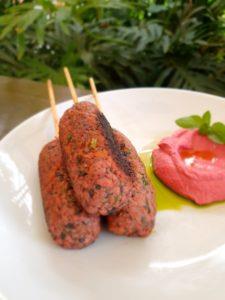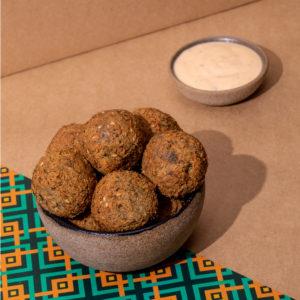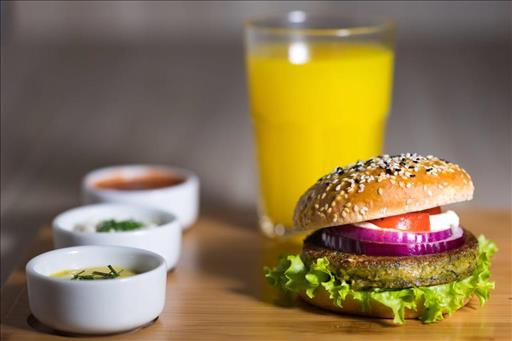
Brand creates Brazilian plant-based kofta, falafel
São Paulo – Falafel was the first product ever developed by Brazil-based food tech Amazonika Mundi . At the time, the company was still called Sottile Alimentos and was searching for some connection with the Amazon. What the founders already knew was that the company was to be plant-based. ''We were already fans of the Arab cuisine, and for the falafel we figured out how to maintain its originality but add something of Brazil to it. So, we brought lima beans to the recipe. We used to participate in many food shows back then, and in 2018 we went to Rock in Rio. Our falafel was a major hit,'' said Thiago Rosolem, CEO and one of the founders of the company. Pictured above, falafel burger, one version of the Arab dish sold by the Brazilian brand.
The original falafel is already based on plants, but Amazonika created a version with Brazilian ingredients. From that moment on, the brand's creators started thinking on new products from Brazilian ingredients. ''We were listening to music and them Morena Tropicana by Alceu Valença started playing, and there's a line that says, ''carne de caju'' [which is Portuguese for cashew beef], and we thought, ''Cashew beef would be a great idea!'', so we started researching and found out that Embrapa already had projects with cashew fiber,'' the entrepreneur said. Embrapa is Brazil's state-run agricultural research agency.
Rosolem also learned that many low-income people in Ceará state had already been using the cashew bagasse and fiber to produce beef-like dishes. ''Our first cashew-based product was the siriju,'' he said about the roll that is similar to crab cakes but is made with cashew fiber. The solution opened doors for new preparations, including the newest kofta.
Brazilian-style kofta
Earlier this month, Amazonika launched in partnership with Embrapa Food Agroindustry two new products: A nugget and another Arab-born food, kofta, from cashew fiber. ''What's great is that in the case of cashew the volume of the discarded fiber was very large, so we managed to use it to support local producers,'' Rosolem points out.

Vegan kofta is made from cashew fiber
Embrapa researcher Janice Lima believes that the challenge in the case of kofta was selecting ingredients that could serve the needs of the industry such as price and availability and emulate sensory properties of animal-based products. As for the cashew fiber developed by Embrapa Tropical Agroindustry , the researchers explain that the product has a nice texture and adds nutritional value.
And to add a bit more of a Brazilian flavor to the products, even more ingredients came from Amazon. In the kofta, the company used assîssî pepper and açaí berry extract. ''The idea is developing a sustainable, actually meaningful project. Everything is traceable with a QR code that will show from whom we bought each ingredient,'' stressed the CEO.
The suppliers were chosen by Amazonika in 2019 when the partners visited the region. From the contact established with institutions such as environmental group Imaflora, the brand has even reworked its firstborn product, falafel. The recipe has gained ingredients such as Amazon's pataua oil since 2020.
A true Brazilian food tech
Based in Niterói, Rio de Janeiro, the brand has research products with the Federal University of Rio de Janeiro and seeks to get established with the national innovation. ''We''ve worked hard to be a food tech, not just a company that reproduces what foreign companies do. The plant-based industry has really grown but has not enough [raw material] to supply the market. Our product is focused on the vegan audience, but we believe that everyone can substitute meat for these products once in a while,'' the founder considered.

Falafel by Amazonika brings together the traditional chickpeas and Santarém's lima beans
With a goal to work with increasingly different ingredients and peoples, Rosolem points out that the brand wants to further its mission. ''We work with three major pillars: Healthiness, sustainability, and flavor. And I''d also like to add innovation. From this point forward, we want the project to grow to reach more people, so that they can taste cashew beef, lima beans, and all these food items from Brazil,'' he said.
In its processes, Amazonika was helped by specialized consulting from different chefs, including Inês Braconnot. The kofta will be launched in these partner restaurants. The idea is taking the experience to the venues to build a hype around the dish, which will eventually be available for buying in retail. Other products by the brand are sold in major specialized chains such as Natural da Terra, Empório São Paulo, and São Paulo's Instituto Chão.
Right now, Amazonika is focused on the domestic market, but the partners have received some proposals for exporting. ''It was not something we''d thought about, but as some suppliers are already exporting, including one that ships frozen açaí pulp to the United States, we have to think, Why not?'', Rosolem says, pointing out that the brand will soon open up for raising capital through a road show.
Translated by Guilherme Miranda
Amazonika MundiThe post Brand creates Brazilian plant-based kofta, falafel appeared first on Agência de Notícias Brasil-Árabe .
.jpg)
Legal Disclaimer:
MENAFN provides the
information “as is” without warranty of any kind. We do not accept
any responsibility or liability for the accuracy, content, images,
videos, licenses, completeness, legality, or reliability of the information
contained in this article. If you have any complaints or copyright
issues related to this article, kindly contact the provider above.


















Comments
No comment